第7章 动词与动词短语 (共141张PPT)2025年中考英语语法突破(广东)
文档属性
| 名称 | 第7章 动词与动词短语 (共141张PPT)2025年中考英语语法突破(广东) |

|
|
| 格式 | pptx | ||
| 文件大小 | 1.9MB | ||
| 资源类型 | 教案 | ||
| 版本资源 | 人教新目标(Go for it)版 | ||
| 科目 | 英语 | ||
| 更新时间 | 2024-12-17 00:00:00 | ||
图片预览

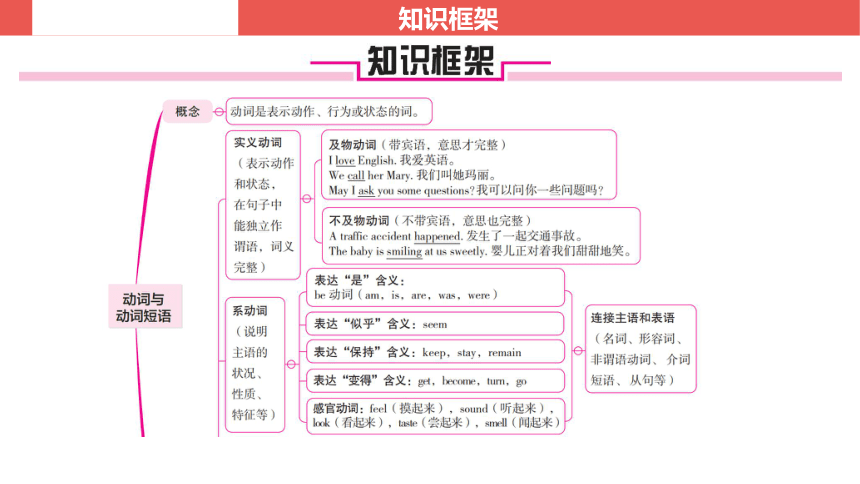
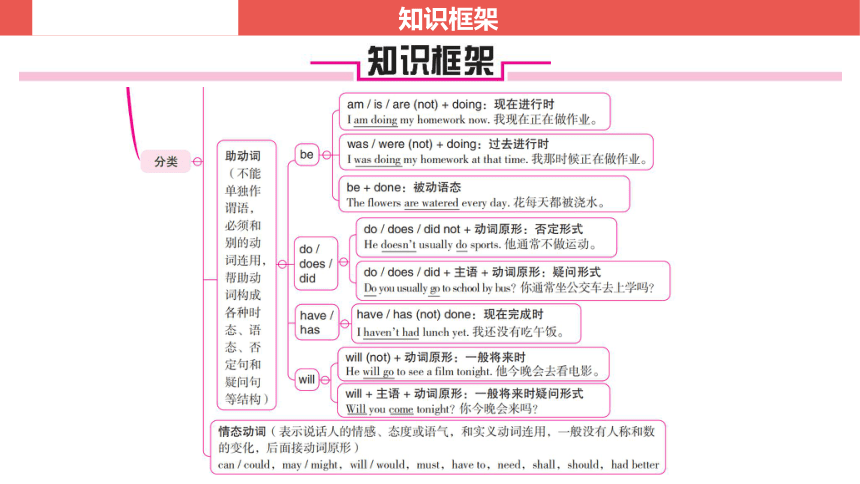
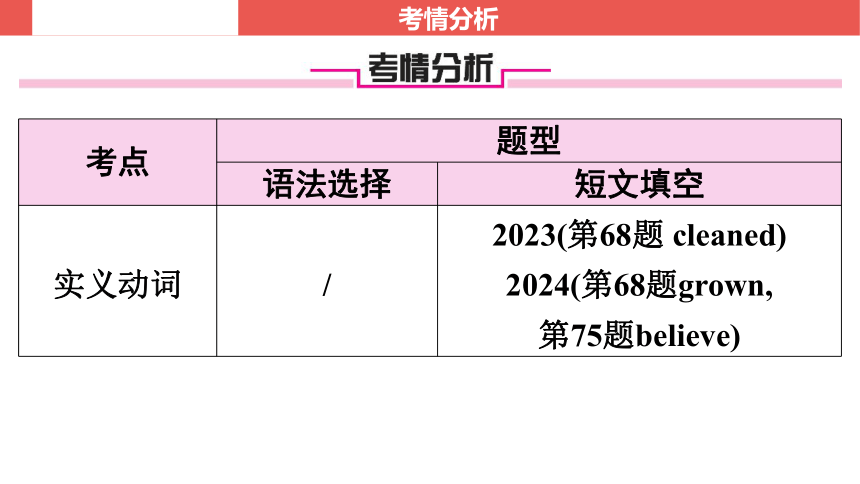

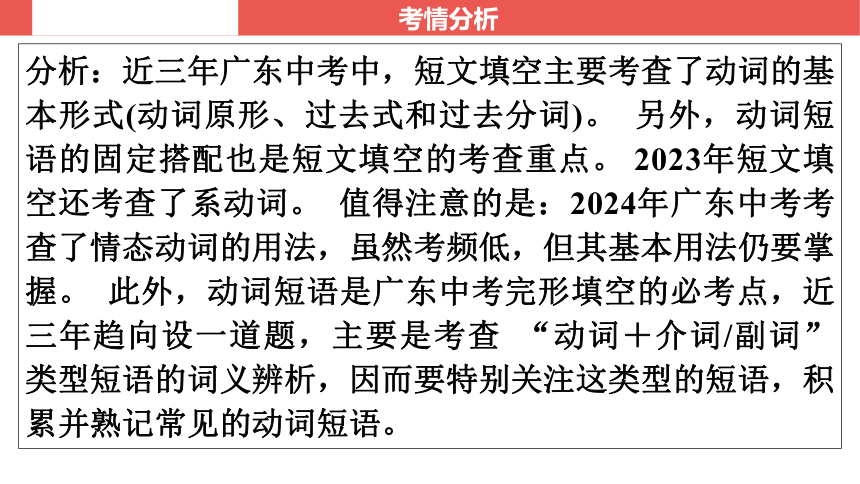
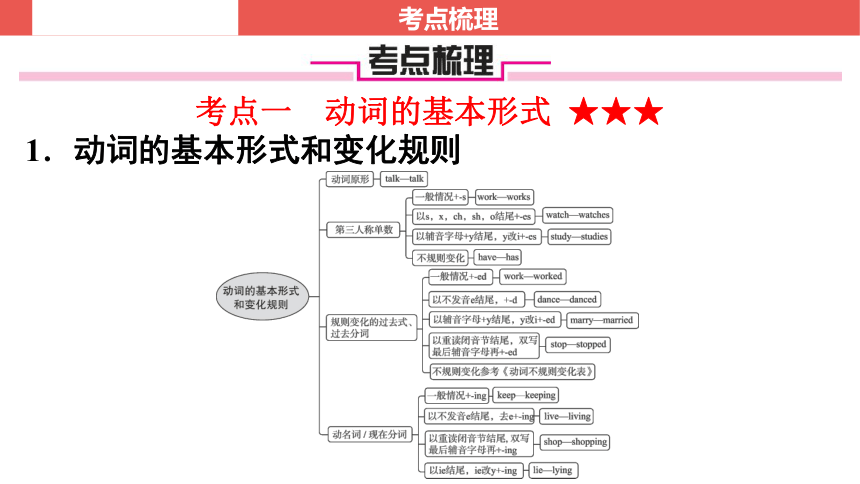


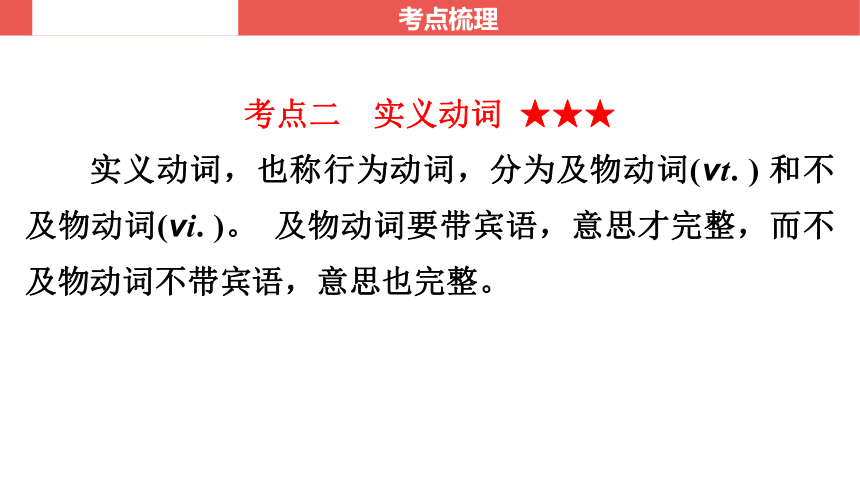

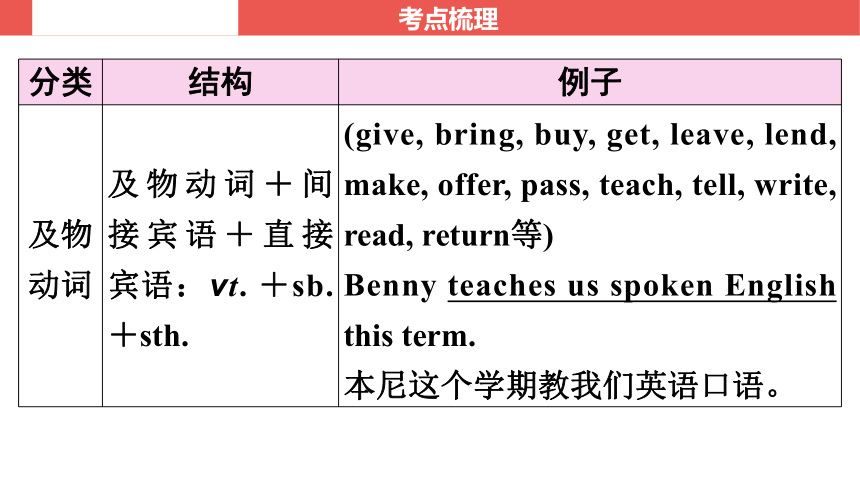
文档简介
(共141张PPT)
第七章 动词与动词短语
第二部分 中考语法突破
知识框架
知识框架
考点 题型
语法选择 短文填空
实义动词 / 2023(第68题 cleaned)
2024(第68题grown,
第75题believe)
考情分析
考点 题型
语法选择 短文填空
系动词 / 2022(第72题 become)
2023(第69题be)
情态动词 2024(第38题can) /
动词短语 / /
考情分析
分析:近三年广东中考中,短文填空主要考查了动词的基本形式(动词原形、过去式和过去分词)。 另外,动词短语的固定搭配也是短文填空的考查重点。 2023年短文填空还考查了系动词。 值得注意的是:2024年广东中考考查了情态动词的用法,虽然考频低,但其基本用法仍要掌握。 此外,动词短语是广东中考完形填空的必考点,近三年趋向设一道题,主要是考查 “动词+介词/副词” 类型短语的词义辨析,因而要特别关注这类型的短语,积累并熟记常见的动词短语。
考情分析
考点一 动词的基本形式 ★★★
1.动词的基本形式和变化规则
考点梳理
2.动词基本形式的用法
考点梳理
1.I don’t have a volleyball, but my brother Jim ________ (do). 【2024·兰州真题】
does
考点梳理
考点二 实义动词 ★★★
实义动词,也称行为动词,分为及物动词(vt. ) 和不及物动词(vi. )。 及物动词要带宾语,意思才完整,而不及物动词不带宾语,意思也完整。
考点梳理
分类 结构 例子
及物动词 及物动词+宾语: vt. +sb. /sth. I love my parents. 我爱我的父母。
及物动词+宾语+宾补: vt. +sb. /sth. +宾补 (make, let, have, watch, notice, hear, see, call等)
The rainy day makes me sad. 雨天使我感到沮丧。
考点梳理
分类 结构 例子
及物动词 及物动词+间接宾语+直接宾语:vt. +sb. +sth. (give, bring, buy, get, leave, lend, make, offer, pass, teach, tell, write, read, return等)
Benny teaches us spoken English this term.
本尼这个学期教我们英语口语。
考点梳理
分类 结构 例子
不及物动词 主语+不及物动词 The baby is smiling. 这个婴儿正在笑。
不及物动词+介词+宾语 The baby is smiling at us. 这个婴儿正对着我们笑。
不及物动词+状语 (时间、地点、程度、方式等) My father arrived at 9∶00 p. m. 我爸爸晚上九点到达。
考点梳理
注意:
(1) 有些动词既是及物动词,又是不及物动词。 如:
We study English. 我们学英语。(该句中study是及物动词)
We study hard. 我们认真学习。(该句中study是不及物
动词)
考点梳理
(2) “vt. +sb. +sth. ” 可转化成 “vt. +sth. +to+sb. ”,适用于该结构的动词有:give, offer, sell, teach, pass, show, lend, promise, tell等。 如:
She gave the woman a ticket. =She gave a ticket to the woman.
她给了这个女人一张票。
考点梳理
(3) “vt. +sb. +sth. ” 可转化成 “vt. +sth. +for+sb. ”,适用于该结构的动词有:buy, cook, choose, prepare, keep。 如:
My father bought me a new mobile phone. =My father bought a new mobile phone for me.
我爸爸给我买了一台新手机。
考点梳理
(4) “vt. +sb. +sth. ” 可转化成 “vt. +sth. +to/for+sb. ”,适用于该结构的动词有:bring, sing, read, get。 如:
The little girl brought me a letter. =The little girl brought a letter to/for me.
那个小女孩带给我一封信。
考点梳理
2.It is said that Shen Nong was the first to ___________ (发现) tea as a drink. 【2024·济宁真题】
3.I’m going to c______ a meal for Dad on Father’s Day. 【2024·济宁真题】
discover
ook
考点梳理
( ) 4.Some days they could spend hours happily together without any argument, but other days they just could not ________ on what to do.
A.agree B.consider C.depend
A
考点梳理
考点三 系动词 ★★
1.系动词,也称连系动词,初中阶段包括:五感官、三变化、三保持、一好像,一个be
五感官 look看起来 smell闻起来 sound听起来 taste尝起来 feel感觉起来;摸起来
三变化 become变成;变得 get变(好/坏/长/短/冷/热……) turn变(颜色)
考点梳理
三保持 keep保持 stay保持 remain保持
一好像 seem似乎;好像
一个be be是(根据时态和人称有is, am, are, was, were, been等变化)
考点梳理
如:She looks excited. What happened 她看起来很兴奋。发生什么事了?
The leaves turn yellow in fall. 树叶在秋天变成黄色。
考点梳理
( ) 5.—The flowers are very beautiful in the park.
—Yes, and they ________ sweet. 【2024·耒阳模拟改编】
A.smell B.taste C.sound
( ) 6.May I have some more chicken It ________ so delicious.
A.feels B.sounds C.tastes
A
C
考点梳理
2.系动词+形容词,作表语
如:The meat smells bad. You’d better throw it away. 这肉闻起来很臭。你最好把它扔掉。
If you want to keep healthy, you can eat more fruit. 如果你想保持健康,你可以多吃水果。
考点梳理
( ) 7.This boy gets ________ for the coming piano competition.
A.nervous B.nervously C.more nervous
A
考点梳理
考点四 助动词 ★
助动词本身没有词义,必须和实义动词、系动词连用。助动词可以移到句首,构成一般疑问句。在助动词后加not, 构成否定句。
考点梳理
常见的助动词 用法
be(am, is, are, was, were) 进行时、被动语态
do(does, did) 一般现在时、一般过去时
have(has, had) 完成时
will(would) 将来时
shall 一般将来时
考点梳理
如:He was training his guide dog at that time. 他那时在训练他的导盲犬。
Will everyone have a robot in the future?将来每个人会有一个机器人吗?
考点梳理
( ) 8.He ________ have breakfast because he woke up late this morning. 【2024·西藏真题改编】
A.did B.doesn’t C.didn’t
C
考点梳理
考点五 情态动词 ★★
情态动词表示说话人的情感、态度或语气。要跟实义动词、系动词连用才有意义,一般没有人称和数的变化,后面接动词原形,否定式直接在后面加not。 情态动词移到句首,构成一般疑问句。
考点梳理
1.常用的情态动词
情态 动词 must can could may might should shall need had better
含义 必须; 肯定 能; 可能 can的过去式;can的委婉语气 可以; 也许 may的过去式;may的委婉语气 应该 应该 (用于第一人称I, we) 必须;必要 (常用否定式) 最好(缩写:’d better)
考点梳理
如:She must study hard so that she can go to a good university.
为了能够上一所好的大学,她必须努力学习。
We can’t always think about ourselves. We should think about others.
我们不能总是想着自己。我们应该考虑下别人。
考点梳理
( ) 9.With the help of modern technology, now people ________ enjoy the proudest moment when China’s first astronaut Yang Liwei entered space.
【2024·镇江真题改编】
A.must B.can C.should
B
考点梳理
2.情态动词表示猜测、推测
情态动词 must can, could, may, might can’t
定义 一定;肯定 也许;可能 不可能;肯定不
考点梳理
注意:must be 意为 “一定是,肯定是”,表示推测;mustn’t 表示 “禁止,不准”,不表示猜测。
如:You must be joking. 你一定是在开玩笑。
You mustn’t play jokes on such a serious thing. 你不能在这么严肃的事情上开玩笑。
The lady can’t be our teacher. She has gone to Shanghai.
这位女士肯定不是我们的老师。她去了上海。
考点梳理
( ) 10.—Whose volleyball is this
—It ________ be Lucy’s. She loves volleyball.
【2024·菏泽真题】
A.can’t B.must C.mustn’t
B
考点梳理
3.情态动词表示请求、命令、许可等
情态动词 含义 否定式
can/could/may/might 可以 后面直接加not, 表示 “不可以”
must 必须 mustn’t 禁止
need 需要 needn’t 不必
should/shall 应该(shall只用于I/we) shouldn’t/shall not 不应该
考点梳理
情态动词 含义 否定式
will/would 愿意;想要 won’t/wouldn’t 不愿意;不想要
have to 不得不(因外界因素) don’t have to 没必要
had better do sth. 最好做某事 had better not do sth. 最好不做某事
考点梳理
如:You mustn’t smoke here.
你不准在这里抽烟。
You’d better tell your father the truth.
你最好告诉你爸爸真相。
考点梳理
( ) 11.Shh…! This is a library. You ________ keep your voice down. 【2024·无锡真题改编】
A.can B.may C.should
C
考点梳理
4.情态动词的用法辨析
(1)“Must…?” 意为 “……必须……吗?”,否定回答不能用No, you mustn’t. (表示禁止)。
肯定回答 Yes, you must. 是的,你必须。
否定回答 No, you needn’t/don’t have to. 不,你没必要。
考点梳理
如:—Must I finish the work now ——我必须现在完成这项工作吗?
—Yes, you must. ——是的,你必须(现在完成)。
—No, you needn’t/don’t have to. ——不,你没必要(现在完成)。(不能用you mustn’t)
考点梳理
(2) “May/Could/Can I…?” 表示请求,意为 “我可以……吗?”,否定回答不能用No, you couldn’t/you may not. (回答不够明确)。
肯定回答 Yes, you can. /Yes, please. /Of course. Certainly. /Sure. /OK. /Go ahead. 是的,你可以。/是的,请。/当然。/可以。/做吧。
考点梳理
否定回答 No, you can’t. /No, you mustn’t. /Sorry, you’d better not. /I’m afraid you can’t. 不,你不能。/不,你不准。/抱歉,你最好不要。/恐怕不行。
考点梳理
如:—May I borrow your book ——我可以借你的书吗?
—Yes, you can. Here you are. ——可以,给你。
—Sorry, I have to read it now. ——抱歉,我现在得看这本书。
考点梳理
(3) “Can/Could you…?” 表示邀请、询问,意为 “你可以……吗?”。
肯定回答 Yes, I can. /Yes, I’d love to. /Of course. /Certainly. /Sure. /OK. 好的,我可以。/好的,我乐意。/当然。/可以。
否定回答 Sorry, I can’t. I have to…/Sorry, I’m afraid not. 抱歉,我不能,我得……/对不起,恐怕不行。
考点梳理
如:—Could you please come to my party tonight ——今晚你能来参加我的晚会吗?
—Yes, I’d like to. ——好的,我乐意(参加)。
—Sorry, I’d love to but I have to finish my homework.
——对不起,我想去但我得完成作业。
考点梳理
(4) can, be able to表示可以、能够。
情态动词 人称变化 时态
can 不变 只有过去时could
be able to 随主语变化 适用所有时态,通过be动词的变化体现时态
考点梳理
如:He will be able to learn English by himself.
他将能够自学英语。
I could swim at the age of 8.
我在8岁的时候就会游泳了。
考点梳理
(5) must, have to表示必须。
情态动词 含义 用法
must 必须;一定要 表示说话人的主观看法
have to 必须;不得不 表示客观需要,受外界影响
如:I have to go now because of the bad weather. 由于天气恶劣,我现在必须走了。
I must study hard from now on. 我从现在开始必须努力学习。
考点梳理
(6) may be, maybe表示也许、可能。
情态动词 构成/属性 位置 区别
may be 情态动词+be动词原形 句中 去除后句子缺少谓语动词
maybe 副词 句首、句末 去除后句子依然完整
如:He may be good at physics. 他可能擅长物理。
Maybe he is good at physics. 他可能擅长物理。
考点梳理
(7) need表示必须、必要,既可作情态动词,又可作实义动词。
词性 否定 用法
情态动词 needn’t=don’t have to没必要 极少用肯定式
实义动词 don’t need 不需要 sb. need(s) to do sth. 某人需要做某事
sth. need(s) doing=sth. need(s) to be done 某物需要被……
考点梳理
如:You needn’t lend your book to your deskmate. 你没必要借书给你的同桌。
I don’t need to get up too early at weekends. 周末我不必太早起床。
The flowers need watering. =The flowers need to be watered. 花要浇水了。
考点梳理
( ) 12.When you make a fresh salad, you ________ add your favourite fruit if you would like to.
【2024·常州真题改编】
A.may B.have to C.must
( ) 13.—Must I answer this question in English
—No, you ________. 【2024·龙东真题改编】
A.mustn’t B.needn’t C.can’t
A
B
考点梳理
考点六 动词短语 ★★★
1.不同类别的动词短语
分类 例子 代词位置 名词位置
动词+副词 turn on打开 give out分发 give up放弃 放中间: turn it on give them out give it up 放中间、后面均可:
turn on the radio=
turn the radio on
考点梳理
分类 例子 代词位置 名词位置
动词+介词 look for寻找 放后面: look for him catch up with us pay attention to her 放后面:
look for my book
动词+副词+介词 catch up with赶上
动词+名词+介词 pay attention to注意
考点梳理
( ) 14.—Mom, could you please ________ the poster (海报) in my bedroom I really like it!
—Sure, baby. 【2024·镇江真题改编】
A.give up B.take up C.put up
C
考点梳理
2.常考的动词短语
(1) 与make有关的短语
be made of由……制成(看得出原材料) be made in在某地制造
be made from由……制成(看不出原材料) be made by由……制造;通过……制作
make up编造(故事、谎言等); 化妆;构成 make friends with sb. 与某人交朋友
考点梳理
如:The bridge is made of stones.
这座桥是由石头建成的。
The wine is made from grapes and is made in France.
这葡萄酒是由葡萄酿制而成,产自法国。
考点梳理
(2) 与come有关的短语
come across(偶然) 遇见或发现 come back回来 come down落;下来
come out出版;出来;开花;发芽 come from来自 come true实现
come to到达;共计 come in进来 come over顺便来访
come up with想出 (主意) come on来吧;加油;赶快;得了吧
考点梳理
如:His dream has come true at last.
他的梦想终于实现了。
Mo Yan’s new novel came out last month.
莫言的新小说上个月出版了。
考点梳理
(3) 与fall 有关的短语
fall asleep入睡 fall behind落后 fall off=fall down from 从……落下
fall down跌落 fall in love with 爱上 fall over 绊倒
如:The young man fell down from his bike by accident.
这个年轻人意外地从自行车上摔了下来。
They all fell asleep quickly after working for a long time.
长时间工作后,他们都很快入睡了。
考点梳理
(4) 与get有关的短语
get away逃离 get back回来;取回 get close to接近
get into陷入;养成(某种习惯) get together相聚;联欢;联合 get on上车
get out of从……出来 get ready for为……做准备 get off下车
get up起床 get on/along well with与……相处融洽 get in the way of 阻碍
考点梳理
如:The students in my class get on well with each other. 我班的学生们彼此相处融洽。
You can’t get off the bus until it stops.
公交车没停下来之前,你不能下车。
考点梳理
(5) 与give有关的短语
give away赠送 give back归还 give out分发
give up放弃 give a hand to sb. 帮助某人 give sb. a lift 捎某人一程
如:My brother gave up smoking last year. 我哥哥去年戒烟了。
We give away old books and money to the poor children. 我们向贫困孩子捐赠旧书和钱。
考点梳理
(6) 与go有关的短语
go away走开 go over仔细检查;复习 go for a walk去散步
go out出去;熄灭 go through浏览;通过;经受 go for a picnic去野餐
go ahead去吧;进行 go on(doing/with sth. ) 继续(做某事) go to bed 上床睡觉
go by经过;走过 go fishing/shopping/skating去钓鱼/购物/滑冰/go home回家
考点梳理
如:You must go over what you have learned.
你必须复习学过的知识。
I won the game just now. Let’s go on playing the game.
我刚才赢了游戏。我们继续玩游戏吧。
考点梳理
(7) 与keep有关的短语
keep off避开;勿踩踏 keep…from… 防止;使……免于…… keep up(with)
保持;维持;跟上
keep doing sth. 继续做某事 keep in touch with与……保持联系 keep one’s promise/ word守信
考点梳理
如:Please keep off the grass.
请勿践踏草坪。
We can keep in touch with each other through WeChat.
我们彼此可以通过微信相互保持联系。
考点梳理
(8) 与look有关的短语
look over检查 look into向里面看;调查 look around向四周看
look after照顾 look down upon看不起;轻视 look out留神;当心
look for寻找 look up查阅;查找;仰望 look through浏览;看穿
look forward to(doing) sth. 盼望(做)某事 look up to 钦佩;仰慕
考点梳理
如:The doctor looked over the baby carefully.
医生很仔细地为这个宝宝检查。
If you don’t know the word, you can look it up in the dictionary.
你若不懂这个单词,可以查一下字典。
考点梳理
(9) 与put有关的短语
put away收拾;放好 put down放下;记下 put off推迟
put on穿上;上演;增加(体重) put out扑灭;熄灭 put up挂起;举起;搭起;张贴
考点梳理
如:The little girl put away her skirts just now. 这个小女孩刚才把自己的裙子收起来了。
Never put off till tomorrow what you can do today. 今日事,今日毕。
考点梳理
(10) 与take有关的短语
take away拿走 take off脱下;起飞 take place发生
take out取出 take care of照顾 take the place of取代;代替
take turns轮流 take part in参加 take it easy别着急;别紧张
考点梳理
take in吸入 take pride in对……感到自豪 take up 占据;开始从事
take after 长得像 take one’s time从容;慢慢行动 take a trip/rest/walk旅行/休息/散步
如:The plane is taking off. 飞机正在起飞。
The old should be taken good care of.
老年人应该被好好照顾。
考点梳理
(11) 与turn有关的短语
turn down调小;拒绝 turn off关掉(水、电器、煤气) turn to翻到;求助于
turn up调大 turn on打开(水、电器、煤气) turn over翻转
考点梳理
如:He can’t wait to turn on the computer every night.
每晚他都迫不及待地打开电脑。
The TV is too loud. Could you please turn it down?
电视太大声,请你调小声点好吗?
考点梳理
( ) 15.—Mom, could I ________ the TV I want to watch the news about space.
—Of course. And don’t sit too close.
【2024·长春真题改编】
A.turn on B.turn off C.put on
A
考点梳理
( ) 16.I know how busy you are and I won’t ________ too much of your time. 【2024·无锡真题改编】
A.take up B.set up C.make up
A
考点梳理
3.常考的动词(短语) 辨析
(1) 与used有关的短语
短语 含义
used to do sth. 过去常常做某事
be/get used to(doing) sth. 习惯(做) 某事
be used to do sth. 被用来做某事
be used for(doing) sth. 被用于(做) 某事
考点梳理
如:I used to get up late, but now I’m used to getting up early.
我过去常常晚起,但现在习惯早起。
Umbrellas are used to keep off the rain. 雨伞用来挡雨。
考点梳理
(2) 到达
用法 例子 注意
get to+地点 get to school get home/ there/here ① home, there, here在此作副词,故前不用介词
② arrive是不及物动词,可以单独使用,如:I arrived.
reach+地点 reach school reach home/ there/here
arrive in+大地方; arrive at+小地方 arrive in Hong Kong arrive at school arrive home/ there/here
考点梳理
如:When will you arrive 你将什么时候到达?
They arrived at the village without rest. 他们没有停歇,到达了小村庄。
考点梳理
(3) 借用、归还
词汇/短语 含义及用法
borrow… from… 从……借来……(借入,短暂性动词)
lend sth. to sb. =lend sb. sth. 把……借给……(借出,短暂性动词)
return=give… back 归还(短暂性动词)
keep 保存;借(延续性动词)
考点梳理
如:I borrowed a book from the school library and I can keep it for a month.
我从学校图书馆借了一本书,我可以保管它一个月。
Could you lend your bike to me/lend me your bike 你可以把自行车借给我吗?
考点梳理
(4) 看
词汇 含义 搭配
look 看(表动作) look at sb. /sth. 朝某人/物看
see 看见(表结果) see sb. do/doing sth. 看见某人(经常) 做/正在做某事
watch 观看;注视 watch TV/a match/a movie看电视/比赛/电影
read 看(书、报); 阅读 read a newspaper看报纸
考点梳理
如:Look at the blackboard, please. Can you see it clearly 请看黑板。你能看清楚它吗?
I’d like to watch a movie tonight. 我想今晚去看电影。
Don’t read books in the sun. It’s bad for your eyes.
别在太阳下看书,这样对眼睛有害。
考点梳理
(5) 说话、谈话
词汇 含义 搭配
say 说 接内容(用 “” 引用,或用it、what、that从句代替说的内容)
speak 说;演讲 接语言;在会议上发言;电话用语(sb. speaking)
talk 交谈;谈论 talk to/with sb. 与某人谈话;talk about sth. 谈论某事物
考点梳理
词汇 含义 搭配
tell 告诉;讲述 tell a story讲故事;tell a lie说谎;tell the truth说出真相;
tell sb. sth. 告诉某人某事;tell sb. (not) to do sth. 告诉某人(不) 要做某事
考点梳理
如:I can’t understand what you said just now. 我不能理解你刚才所说的话。
Many people in the world speak English. 世界上很多人讲英语。
He likes talking to/with me. 他喜欢跟我交谈。
She told me a secret yesterday. 她昨天告诉我一个秘密。
考点梳理
(6) 花费
词汇 含义 主语 用法
spend 花费(时间或钱) 人 sb. spend… on sth. /sb. spend… (in) doing sth.
某人在某事物上花费……
sb. spend time with sb. 某人花时间和某人在一起
考点梳理
词汇 含义 主语 用法
pay 支付(钱); 赔偿 人 sb. pay some money for sth. 某人为某物支付金钱
cost 花费(钱) 物 sth. cost sb. some money某物花费某人金钱
考点梳理
词汇 含义 主语 用法
take 花费(时间) It或 Doing sth. It takes sb. some time+to do sth. =Doing sth. takes sb. some time做某事花费某人时间
考点梳理
如:I spent 30 yuan on the book. =I spent 30 yuan(in) buying the book.
=The book cost me 30 yuan. =I paid 30 yuan for the book.
我花了30元买这本书。
It took me an hour to repair the bike. =I spent an hour(in) repairing the bike.
我花了一个小时修理这辆自行车。
考点梳理
(7) 拿来、带走
词汇 含义及用法
bring 拿走;带来
take 拿去;带走
carry 扛;搬;抱(常用于重物)
考点梳理
如:Sorry, I forgot to bring my bag here. 抱歉,我忘记把包带来这里了。
Kate, take the umbrella with you. It’s going to rain. 凯特,带把伞去,快下雨了。
The box is too heavy to carry. 这箱子太重了,抬不起。
考点梳理
(8) 穿着
词汇/短语 含义及用法 搭配
wear 穿着;戴着(表状态,延续性动词,后接衣服、饰品等) wear a coat 穿着外套
wear glasses 戴着眼镜
put on 穿上(表动作,非延续性动词,宾语或代词可以放中间) put on sth. =put sth. on
考点梳理
词汇/短语 含义及用法 搭配
dress 穿衣服(表示帮某人穿衣,可以表示状态,也可以表示动作) dress sb. 给某人穿衣
dress oneself 自己穿衣服
dress up as 装扮成
in 表示穿着某颜色的衣服(后接颜色,常作后置定语) in white 穿着白衣服
考点梳理
如:Look at the man in green! He is wearing a thick coat on such a hot day! When did he put it on
看那个穿绿衣服的男士! 他大热天穿着一件厚厚的大衣! 他什么时候穿上的?
Children dress up as ghosts on Halloween. 孩子们在万圣夜装扮成幽灵的样子。
考点梳理
(9) 听
词汇 含义及用法 搭配
listen 听(表动作过程) Listen!听!
listen to sth. /sb. 听……
hear 听到(表结果) hear sb. do/doing sth. 听到某人(经常) 做/正在做某事
hear about/of sth. 听说某事
hear from sb. 收到某人的来信
sound 听起来(后接形容词) It sounds great!听起来很棒!
考点梳理
如:Listen! There is a girl singing outside. Can you hear It sounds fantastic!
听! 有个女孩在外面唱歌。你能听见吗? 听起来太美妙了!
考点梳理
词汇/短语 含义及用法
look for 寻找(强调过程)
find 找到(强调结果)
find out 查明(强调经过调查等手段得到结果)
(10) 查找、查明
考点梳理
如:I looked for my key everywhere, but I couldn’t find it. 我到处找钥匙,但我找不到。
The window is broken. Can you find out who broke it
窗户破了。你能查出是谁打破的吗?
考点梳理
词汇 含义 搭配
leave 落下;留下;离开 leave sth. somewhere把某物落在某地
leave sb. alone 留某人独处
leave somewhere离开某地
leave for somewhere去某地
forget 忘记 forget to do sth. 忘记要做某事
forget doing sth. 忘记做过某事
lose 丢失 lose one’s way迷路
lose oneself in 沉迷
(11) 丢失、忘记
考点梳理
如:I forgot to take my bag home. Maybe I left it in the reading room.
我忘记把包带回家了。可能我把它落在阅览室了。
I lost my watch and I wanted to buy a new one. 我的手表丢了,我想买个新的。
考点梳理
词汇 含义及用法 搭配
join 参加(加入某组织并成为其中一员) join the party/the army/the club/us
入党/参军/加入俱乐部/加入我们
take part in=join in 参加(临时性活动) take part in/join in the party/activities
参加聚会/活动
attend 参加(正式活动) attend the meeting/university 参加会议/上大学
(12) 参加
考点梳理
如:Come and join us!快来加入我们吧!
We’ll take part in social practice during the summer vacation.
我们将在暑期参加社会实践。
考点梳理
(13) 输赢
词汇 含义 搭配
lose 输给;丢掉 lose to sb. 输给某人
lose the game输掉比赛
lose heart失去信心
fail 失败;不及格 fail to do sth. 未能做某事
fail the exam考试不及格
考点梳理
词汇 含义 搭配
beat 打败(人、队伍) beat sb. 打败某人
beat a strong team打败强队
win 赢得(荣誉、地位、比赛、战争等) win first prize/the game/the speaking contest/the war 赢得一等奖/比赛/演讲比赛/战争
win one’s heart 赢得某人的心
考点梳理
如:We lost the match. =We didn’t win the match. 我们比赛输了。
Team A beat Team B.A组打败了B组。
考点梳理
(14) 变化
词汇 含义及用法 搭配
turn 成为;变成(多用于颜色、形状等变化) turn red变红
get 渐渐变得(多用于谈论事物或天气变化) get colder变得更冷
become 变得;变成;成为(多指身份、职位或趋势的变化) become a teacher成为老师
考点梳理
如:The leaves turned brown. 叶子变成了褐色。
The sky got dark soon. 天很快变黑了。
Traditional Chinese Medicine has become popular recently. 中医最近变得很受欢迎。
考点梳理
( ) 17.—How much does the film ticket ________?
—Thirty-five yuan. 【2024·绥化真题改编】
A.spend B.cost C.pay
B
考点梳理
( ) 18.—My father ________ to his workplace by bus, but now he ________ there by bike.
—Really You have an environmentally-friendly father.
A.used to go; is used to go
B.used to going; is used to go
C.used to go; is used to going
C
考点梳理
动词(短语) 与短文填空
(1) 首先分析句子结构,确定空格处充当的成分及词性。
(2) 根据上下文语境,确定空格处的词义。
(3) 观察空格前后的内容,选择恰当的动词形式。
技巧点拨
But since her hometown hosted the Asian Games in 2023, her interest in sports has 68 a lot.
【2024·广东真题】
always among and answer believe big but city grow seldom they whenever
技巧点拨
解析:根据 “But since her hometown hosted the Asian Games in 2023, her interest in sports has… a lot. ” 和备选词可知,她对体育的兴趣增长了很多,grow “增加” 符合语境,且该句缺少完整的谓语,而由空格前的 “has” 可推断,此处应使用现在完成时,动词需用过去分词形式,故填grown。
技巧点拨
It might 69 the world’s earliest form of toothbrushes.
【2023·广东真题】
解析:从句子成分分析,句子缺谓语,根据上下文可知此处是指 “它可能是世界上最早的牙刷样式”。 因此从可选词实词中选出比较符合句意的是be, 前面 “might” 是情态动词,其后接动词原形,故答案是be。
it either be because what else by invent clean popular habit hundred
技巧点拨
一、单项选择
( ) 1.In Switzerland, a country with high mountains and clean blue lakes, people ________ its rich resources(资源) to live. 【2024·宿迁真题改编】
A.carry on B.try on C.depend on
C
中考集训
( ) 2.Tina can ________ her bedroom by herself. She doesn’t need her parents’ help. 【2024·吉林真题改编】
A.get up B.clean up C.cut up
( ) 3.—What do you think of the chicken soup, Helen
—It ________ really good. I’d like to drink more.
【2024·广西真题】
A.tastes B.feels C.sounds
B
A
中考集训
( ) 4.Lili ________ be at home. She has gone to the farm to pick apples. 【2024·长春真题改编】
A.mustn’t B.can’t C.must
( ) 5.—Bill, ________ I use your ruler
—Of course you can. Here you are.
【2024·北京真题改编】
A.can B.must C.need
B
A
中考集训
二、用所给词的正确形式填空
1.I can’t _________(agree) that pupils bring their mobile phones to school. 【2024·牡丹江真题】
2.The bus was so crowded that they had to ________ (wait) for the next one. 【2024·云南真题】
3.The Internet can be a useful tool, but don’t let it ________(take) up all of your time. 【2024·白银真题】
agree
wait
take
中考集训
4.Nowadays, the number of people who watch TV _____ (be) getting smaller than before because of smartphones. 【2024·黑龙江模拟】
5.Go for it! There’s still a long way to move forward before you __________(success). 【2024·五华区模拟】
is
succeed
中考集训
三、完形填空 【2024·兰州真题改编】
Peng Jingxuan, a girl from Hunan, was well-known for playing the guzheng near the Eiffel Tower in 2018. The beautiful melodies(旋律) from her guzheng got tons of attention from listeners.
中考集训
She has been playing the guzheng since she was 7 years old. She loves playing the guzheng, an ancient musical instrument that 1 more than 2,500 years.
( ) 1.A.comes back B.dates back
C.puts up D. gives up
dates back
B
中考集训
She went to France for further study and found that street performances in Paris were very popular. She tried playing the guzheng on the streets and 2 a warm welcome.
( ) 2.A.avoided B.finished
C.bought D. received
received
D
中考集训
“I want to 3 the Chinese stories well in my own way,” Peng Jingxuan said. “I played many wonderful pieces on the streets. The more I 4 , the prouder I felt.
( ) 3.A.tell B.imagine
C.win D. remind
( ) 4.A.played B.sold
C.paid D. found
tell
A
played
A
中考集训
She carefully 5 music, and her performance included traditional guzheng pieces and pop songs with Chinese elements(要素). “My dream is to make more people be interested in the guzheng,” she said.
( ) 5.A.heard B.marked
C.picked D. tested
picked
C
中考集训
一、语法选择 【2024·重庆真题A卷改编】
When I was a child, I wanted to be someone like my father. My father 1 a teacher, and he has taught me a lot. On my tenth birthday, he asked me, “What will you
2 when you grow up?”
( ) 1.A.is B.be C.are
( ) 2.A.did B.do C.does
is
A
do
B
语篇训练
I 3 proudly, “Be a teacher like you!” Hearing this, my father was very happy and said to me, “Try your best and your dream 4 .
( ) 3.A.answer B.am answering C.answered
( ) 4.A.comes true
B.was coming true
C.will come true
answered
C
will come true
C
语篇训练
In the fourth year of my college, I volunteered in a school. One of the teachers 5 ill. She wanted me
6 her place for two weeks. I was glad but nervous. My father said, “This is a good chance. I know you 7 . do it!”
( ) 5.A.will be B.was C.is
( ) 6.A.taking B.take C.to take
( ) 7.A.can B.must C.should
was
B
to take
can
C
A
语篇训练
The next day, I 8 to the class by the head teacher of the school. The children 9 very happy. With other teachers’ help, I did very well.
( ) 8.A.was introduced B.is introduced
C.will be introduced
( ) 9.A.was feeling B.have felt
C.felt
was introduced
A
felt
C
语篇训练
Personally, the experience 10 me even more interested in being a teacher in the future.
( ) 10.A.was making
B.has made
C.will make
has made
B
语篇训练
二、短文填空(原创时文)
请从方框内选择适当的词并用其正确形式填空,使文章完整连贯。 注意:每空一词,每词仅用一次,有两词为多余项。
语篇训练
Designed and built by eight Dutch engineers, the world’s longest rideable bicycle is 180 feet long(55.16 meters).
could cost for our ride and together spend think be start read
语篇训练
39-year-old Ivan Schalk had been thinking about building the world’s longest bicycle since he 1 .about it in a Guinness Book of Records(吉尼斯世界纪录大全) when he was a child. However, he only 2 this project several years ago, as a way to fill up his free time.
could cost for our ride and together spend think be start read
read
started
语篇训练
He knew it wasn’t an easy thing that he 3 build himself. As a result, he looked 4 the help of people like him in his home village. Together, they 5 about four years working on the world’s longest bicycle.
could cost for our ride and together spend think be start read
could
for
spent
语篇训练
“I’ve 6 about the idea for years,” Schalk told Guinness Records. “The goal was to break the world record for the longest bicycle in the world. To achieve this, we thought of all the rules of Guinness World Records(GWR) when building 7 bicycle.
could cost for our ride and together spend think be start read
thought
our
语篇训练
Two people at most are allowed to 8 the 55. 16-meter-long bicycle. However, Schalk also allowed three other people to sit on the long metal structure(结构) connecting the front 9 the back of the bike.
could cost for our ride and together spend think be start read
ride
and
语篇训练
Recently, the team have got the good news from Guinness. They 10 now the proud owners of two world records—the record for the world’s longest tandem (双人自行车) and the record for the world’s largest rideable bicycle.
could cost for our ride and together spend think be start read
are
语篇训练
1.________ 2.___________ 3.___________
4.________ 5.___________ 6.___________
7.________ 8.__________ 9.___________
10._______
read
started
could
for
spent
thought
our
ride
and
are
语篇训练
第七章 动词与动词短语
第二部分 中考语法突破
知识框架
知识框架
考点 题型
语法选择 短文填空
实义动词 / 2023(第68题 cleaned)
2024(第68题grown,
第75题believe)
考情分析
考点 题型
语法选择 短文填空
系动词 / 2022(第72题 become)
2023(第69题be)
情态动词 2024(第38题can) /
动词短语 / /
考情分析
分析:近三年广东中考中,短文填空主要考查了动词的基本形式(动词原形、过去式和过去分词)。 另外,动词短语的固定搭配也是短文填空的考查重点。 2023年短文填空还考查了系动词。 值得注意的是:2024年广东中考考查了情态动词的用法,虽然考频低,但其基本用法仍要掌握。 此外,动词短语是广东中考完形填空的必考点,近三年趋向设一道题,主要是考查 “动词+介词/副词” 类型短语的词义辨析,因而要特别关注这类型的短语,积累并熟记常见的动词短语。
考情分析
考点一 动词的基本形式 ★★★
1.动词的基本形式和变化规则
考点梳理
2.动词基本形式的用法
考点梳理
1.I don’t have a volleyball, but my brother Jim ________ (do). 【2024·兰州真题】
does
考点梳理
考点二 实义动词 ★★★
实义动词,也称行为动词,分为及物动词(vt. ) 和不及物动词(vi. )。 及物动词要带宾语,意思才完整,而不及物动词不带宾语,意思也完整。
考点梳理
分类 结构 例子
及物动词 及物动词+宾语: vt. +sb. /sth. I love my parents. 我爱我的父母。
及物动词+宾语+宾补: vt. +sb. /sth. +宾补 (make, let, have, watch, notice, hear, see, call等)
The rainy day makes me sad. 雨天使我感到沮丧。
考点梳理
分类 结构 例子
及物动词 及物动词+间接宾语+直接宾语:vt. +sb. +sth. (give, bring, buy, get, leave, lend, make, offer, pass, teach, tell, write, read, return等)
Benny teaches us spoken English this term.
本尼这个学期教我们英语口语。
考点梳理
分类 结构 例子
不及物动词 主语+不及物动词 The baby is smiling. 这个婴儿正在笑。
不及物动词+介词+宾语 The baby is smiling at us. 这个婴儿正对着我们笑。
不及物动词+状语 (时间、地点、程度、方式等) My father arrived at 9∶00 p. m. 我爸爸晚上九点到达。
考点梳理
注意:
(1) 有些动词既是及物动词,又是不及物动词。 如:
We study English. 我们学英语。(该句中study是及物动词)
We study hard. 我们认真学习。(该句中study是不及物
动词)
考点梳理
(2) “vt. +sb. +sth. ” 可转化成 “vt. +sth. +to+sb. ”,适用于该结构的动词有:give, offer, sell, teach, pass, show, lend, promise, tell等。 如:
She gave the woman a ticket. =She gave a ticket to the woman.
她给了这个女人一张票。
考点梳理
(3) “vt. +sb. +sth. ” 可转化成 “vt. +sth. +for+sb. ”,适用于该结构的动词有:buy, cook, choose, prepare, keep。 如:
My father bought me a new mobile phone. =My father bought a new mobile phone for me.
我爸爸给我买了一台新手机。
考点梳理
(4) “vt. +sb. +sth. ” 可转化成 “vt. +sth. +to/for+sb. ”,适用于该结构的动词有:bring, sing, read, get。 如:
The little girl brought me a letter. =The little girl brought a letter to/for me.
那个小女孩带给我一封信。
考点梳理
2.It is said that Shen Nong was the first to ___________ (发现) tea as a drink. 【2024·济宁真题】
3.I’m going to c______ a meal for Dad on Father’s Day. 【2024·济宁真题】
discover
ook
考点梳理
( ) 4.Some days they could spend hours happily together without any argument, but other days they just could not ________ on what to do.
A.agree B.consider C.depend
A
考点梳理
考点三 系动词 ★★
1.系动词,也称连系动词,初中阶段包括:五感官、三变化、三保持、一好像,一个be
五感官 look看起来 smell闻起来 sound听起来 taste尝起来 feel感觉起来;摸起来
三变化 become变成;变得 get变(好/坏/长/短/冷/热……) turn变(颜色)
考点梳理
三保持 keep保持 stay保持 remain保持
一好像 seem似乎;好像
一个be be是(根据时态和人称有is, am, are, was, were, been等变化)
考点梳理
如:She looks excited. What happened 她看起来很兴奋。发生什么事了?
The leaves turn yellow in fall. 树叶在秋天变成黄色。
考点梳理
( ) 5.—The flowers are very beautiful in the park.
—Yes, and they ________ sweet. 【2024·耒阳模拟改编】
A.smell B.taste C.sound
( ) 6.May I have some more chicken It ________ so delicious.
A.feels B.sounds C.tastes
A
C
考点梳理
2.系动词+形容词,作表语
如:The meat smells bad. You’d better throw it away. 这肉闻起来很臭。你最好把它扔掉。
If you want to keep healthy, you can eat more fruit. 如果你想保持健康,你可以多吃水果。
考点梳理
( ) 7.This boy gets ________ for the coming piano competition.
A.nervous B.nervously C.more nervous
A
考点梳理
考点四 助动词 ★
助动词本身没有词义,必须和实义动词、系动词连用。助动词可以移到句首,构成一般疑问句。在助动词后加not, 构成否定句。
考点梳理
常见的助动词 用法
be(am, is, are, was, were) 进行时、被动语态
do(does, did) 一般现在时、一般过去时
have(has, had) 完成时
will(would) 将来时
shall 一般将来时
考点梳理
如:He was training his guide dog at that time. 他那时在训练他的导盲犬。
Will everyone have a robot in the future?将来每个人会有一个机器人吗?
考点梳理
( ) 8.He ________ have breakfast because he woke up late this morning. 【2024·西藏真题改编】
A.did B.doesn’t C.didn’t
C
考点梳理
考点五 情态动词 ★★
情态动词表示说话人的情感、态度或语气。要跟实义动词、系动词连用才有意义,一般没有人称和数的变化,后面接动词原形,否定式直接在后面加not。 情态动词移到句首,构成一般疑问句。
考点梳理
1.常用的情态动词
情态 动词 must can could may might should shall need had better
含义 必须; 肯定 能; 可能 can的过去式;can的委婉语气 可以; 也许 may的过去式;may的委婉语气 应该 应该 (用于第一人称I, we) 必须;必要 (常用否定式) 最好(缩写:’d better)
考点梳理
如:She must study hard so that she can go to a good university.
为了能够上一所好的大学,她必须努力学习。
We can’t always think about ourselves. We should think about others.
我们不能总是想着自己。我们应该考虑下别人。
考点梳理
( ) 9.With the help of modern technology, now people ________ enjoy the proudest moment when China’s first astronaut Yang Liwei entered space.
【2024·镇江真题改编】
A.must B.can C.should
B
考点梳理
2.情态动词表示猜测、推测
情态动词 must can, could, may, might can’t
定义 一定;肯定 也许;可能 不可能;肯定不
考点梳理
注意:must be 意为 “一定是,肯定是”,表示推测;mustn’t 表示 “禁止,不准”,不表示猜测。
如:You must be joking. 你一定是在开玩笑。
You mustn’t play jokes on such a serious thing. 你不能在这么严肃的事情上开玩笑。
The lady can’t be our teacher. She has gone to Shanghai.
这位女士肯定不是我们的老师。她去了上海。
考点梳理
( ) 10.—Whose volleyball is this
—It ________ be Lucy’s. She loves volleyball.
【2024·菏泽真题】
A.can’t B.must C.mustn’t
B
考点梳理
3.情态动词表示请求、命令、许可等
情态动词 含义 否定式
can/could/may/might 可以 后面直接加not, 表示 “不可以”
must 必须 mustn’t 禁止
need 需要 needn’t 不必
should/shall 应该(shall只用于I/we) shouldn’t/shall not 不应该
考点梳理
情态动词 含义 否定式
will/would 愿意;想要 won’t/wouldn’t 不愿意;不想要
have to 不得不(因外界因素) don’t have to 没必要
had better do sth. 最好做某事 had better not do sth. 最好不做某事
考点梳理
如:You mustn’t smoke here.
你不准在这里抽烟。
You’d better tell your father the truth.
你最好告诉你爸爸真相。
考点梳理
( ) 11.Shh…! This is a library. You ________ keep your voice down. 【2024·无锡真题改编】
A.can B.may C.should
C
考点梳理
4.情态动词的用法辨析
(1)“Must…?” 意为 “……必须……吗?”,否定回答不能用No, you mustn’t. (表示禁止)。
肯定回答 Yes, you must. 是的,你必须。
否定回答 No, you needn’t/don’t have to. 不,你没必要。
考点梳理
如:—Must I finish the work now ——我必须现在完成这项工作吗?
—Yes, you must. ——是的,你必须(现在完成)。
—No, you needn’t/don’t have to. ——不,你没必要(现在完成)。(不能用you mustn’t)
考点梳理
(2) “May/Could/Can I…?” 表示请求,意为 “我可以……吗?”,否定回答不能用No, you couldn’t/you may not. (回答不够明确)。
肯定回答 Yes, you can. /Yes, please. /Of course. Certainly. /Sure. /OK. /Go ahead. 是的,你可以。/是的,请。/当然。/可以。/做吧。
考点梳理
否定回答 No, you can’t. /No, you mustn’t. /Sorry, you’d better not. /I’m afraid you can’t. 不,你不能。/不,你不准。/抱歉,你最好不要。/恐怕不行。
考点梳理
如:—May I borrow your book ——我可以借你的书吗?
—Yes, you can. Here you are. ——可以,给你。
—Sorry, I have to read it now. ——抱歉,我现在得看这本书。
考点梳理
(3) “Can/Could you…?” 表示邀请、询问,意为 “你可以……吗?”。
肯定回答 Yes, I can. /Yes, I’d love to. /Of course. /Certainly. /Sure. /OK. 好的,我可以。/好的,我乐意。/当然。/可以。
否定回答 Sorry, I can’t. I have to…/Sorry, I’m afraid not. 抱歉,我不能,我得……/对不起,恐怕不行。
考点梳理
如:—Could you please come to my party tonight ——今晚你能来参加我的晚会吗?
—Yes, I’d like to. ——好的,我乐意(参加)。
—Sorry, I’d love to but I have to finish my homework.
——对不起,我想去但我得完成作业。
考点梳理
(4) can, be able to表示可以、能够。
情态动词 人称变化 时态
can 不变 只有过去时could
be able to 随主语变化 适用所有时态,通过be动词的变化体现时态
考点梳理
如:He will be able to learn English by himself.
他将能够自学英语。
I could swim at the age of 8.
我在8岁的时候就会游泳了。
考点梳理
(5) must, have to表示必须。
情态动词 含义 用法
must 必须;一定要 表示说话人的主观看法
have to 必须;不得不 表示客观需要,受外界影响
如:I have to go now because of the bad weather. 由于天气恶劣,我现在必须走了。
I must study hard from now on. 我从现在开始必须努力学习。
考点梳理
(6) may be, maybe表示也许、可能。
情态动词 构成/属性 位置 区别
may be 情态动词+be动词原形 句中 去除后句子缺少谓语动词
maybe 副词 句首、句末 去除后句子依然完整
如:He may be good at physics. 他可能擅长物理。
Maybe he is good at physics. 他可能擅长物理。
考点梳理
(7) need表示必须、必要,既可作情态动词,又可作实义动词。
词性 否定 用法
情态动词 needn’t=don’t have to没必要 极少用肯定式
实义动词 don’t need 不需要 sb. need(s) to do sth. 某人需要做某事
sth. need(s) doing=sth. need(s) to be done 某物需要被……
考点梳理
如:You needn’t lend your book to your deskmate. 你没必要借书给你的同桌。
I don’t need to get up too early at weekends. 周末我不必太早起床。
The flowers need watering. =The flowers need to be watered. 花要浇水了。
考点梳理
( ) 12.When you make a fresh salad, you ________ add your favourite fruit if you would like to.
【2024·常州真题改编】
A.may B.have to C.must
( ) 13.—Must I answer this question in English
—No, you ________. 【2024·龙东真题改编】
A.mustn’t B.needn’t C.can’t
A
B
考点梳理
考点六 动词短语 ★★★
1.不同类别的动词短语
分类 例子 代词位置 名词位置
动词+副词 turn on打开 give out分发 give up放弃 放中间: turn it on give them out give it up 放中间、后面均可:
turn on the radio=
turn the radio on
考点梳理
分类 例子 代词位置 名词位置
动词+介词 look for寻找 放后面: look for him catch up with us pay attention to her 放后面:
look for my book
动词+副词+介词 catch up with赶上
动词+名词+介词 pay attention to注意
考点梳理
( ) 14.—Mom, could you please ________ the poster (海报) in my bedroom I really like it!
—Sure, baby. 【2024·镇江真题改编】
A.give up B.take up C.put up
C
考点梳理
2.常考的动词短语
(1) 与make有关的短语
be made of由……制成(看得出原材料) be made in在某地制造
be made from由……制成(看不出原材料) be made by由……制造;通过……制作
make up编造(故事、谎言等); 化妆;构成 make friends with sb. 与某人交朋友
考点梳理
如:The bridge is made of stones.
这座桥是由石头建成的。
The wine is made from grapes and is made in France.
这葡萄酒是由葡萄酿制而成,产自法国。
考点梳理
(2) 与come有关的短语
come across(偶然) 遇见或发现 come back回来 come down落;下来
come out出版;出来;开花;发芽 come from来自 come true实现
come to到达;共计 come in进来 come over顺便来访
come up with想出 (主意) come on来吧;加油;赶快;得了吧
考点梳理
如:His dream has come true at last.
他的梦想终于实现了。
Mo Yan’s new novel came out last month.
莫言的新小说上个月出版了。
考点梳理
(3) 与fall 有关的短语
fall asleep入睡 fall behind落后 fall off=fall down from 从……落下
fall down跌落 fall in love with 爱上 fall over 绊倒
如:The young man fell down from his bike by accident.
这个年轻人意外地从自行车上摔了下来。
They all fell asleep quickly after working for a long time.
长时间工作后,他们都很快入睡了。
考点梳理
(4) 与get有关的短语
get away逃离 get back回来;取回 get close to接近
get into陷入;养成(某种习惯) get together相聚;联欢;联合 get on上车
get out of从……出来 get ready for为……做准备 get off下车
get up起床 get on/along well with与……相处融洽 get in the way of 阻碍
考点梳理
如:The students in my class get on well with each other. 我班的学生们彼此相处融洽。
You can’t get off the bus until it stops.
公交车没停下来之前,你不能下车。
考点梳理
(5) 与give有关的短语
give away赠送 give back归还 give out分发
give up放弃 give a hand to sb. 帮助某人 give sb. a lift 捎某人一程
如:My brother gave up smoking last year. 我哥哥去年戒烟了。
We give away old books and money to the poor children. 我们向贫困孩子捐赠旧书和钱。
考点梳理
(6) 与go有关的短语
go away走开 go over仔细检查;复习 go for a walk去散步
go out出去;熄灭 go through浏览;通过;经受 go for a picnic去野餐
go ahead去吧;进行 go on(doing/with sth. ) 继续(做某事) go to bed 上床睡觉
go by经过;走过 go fishing/shopping/skating去钓鱼/购物/滑冰/go home回家
考点梳理
如:You must go over what you have learned.
你必须复习学过的知识。
I won the game just now. Let’s go on playing the game.
我刚才赢了游戏。我们继续玩游戏吧。
考点梳理
(7) 与keep有关的短语
keep off避开;勿踩踏 keep…from… 防止;使……免于…… keep up(with)
保持;维持;跟上
keep doing sth. 继续做某事 keep in touch with与……保持联系 keep one’s promise/ word守信
考点梳理
如:Please keep off the grass.
请勿践踏草坪。
We can keep in touch with each other through WeChat.
我们彼此可以通过微信相互保持联系。
考点梳理
(8) 与look有关的短语
look over检查 look into向里面看;调查 look around向四周看
look after照顾 look down upon看不起;轻视 look out留神;当心
look for寻找 look up查阅;查找;仰望 look through浏览;看穿
look forward to(doing) sth. 盼望(做)某事 look up to 钦佩;仰慕
考点梳理
如:The doctor looked over the baby carefully.
医生很仔细地为这个宝宝检查。
If you don’t know the word, you can look it up in the dictionary.
你若不懂这个单词,可以查一下字典。
考点梳理
(9) 与put有关的短语
put away收拾;放好 put down放下;记下 put off推迟
put on穿上;上演;增加(体重) put out扑灭;熄灭 put up挂起;举起;搭起;张贴
考点梳理
如:The little girl put away her skirts just now. 这个小女孩刚才把自己的裙子收起来了。
Never put off till tomorrow what you can do today. 今日事,今日毕。
考点梳理
(10) 与take有关的短语
take away拿走 take off脱下;起飞 take place发生
take out取出 take care of照顾 take the place of取代;代替
take turns轮流 take part in参加 take it easy别着急;别紧张
考点梳理
take in吸入 take pride in对……感到自豪 take up 占据;开始从事
take after 长得像 take one’s time从容;慢慢行动 take a trip/rest/walk旅行/休息/散步
如:The plane is taking off. 飞机正在起飞。
The old should be taken good care of.
老年人应该被好好照顾。
考点梳理
(11) 与turn有关的短语
turn down调小;拒绝 turn off关掉(水、电器、煤气) turn to翻到;求助于
turn up调大 turn on打开(水、电器、煤气) turn over翻转
考点梳理
如:He can’t wait to turn on the computer every night.
每晚他都迫不及待地打开电脑。
The TV is too loud. Could you please turn it down?
电视太大声,请你调小声点好吗?
考点梳理
( ) 15.—Mom, could I ________ the TV I want to watch the news about space.
—Of course. And don’t sit too close.
【2024·长春真题改编】
A.turn on B.turn off C.put on
A
考点梳理
( ) 16.I know how busy you are and I won’t ________ too much of your time. 【2024·无锡真题改编】
A.take up B.set up C.make up
A
考点梳理
3.常考的动词(短语) 辨析
(1) 与used有关的短语
短语 含义
used to do sth. 过去常常做某事
be/get used to(doing) sth. 习惯(做) 某事
be used to do sth. 被用来做某事
be used for(doing) sth. 被用于(做) 某事
考点梳理
如:I used to get up late, but now I’m used to getting up early.
我过去常常晚起,但现在习惯早起。
Umbrellas are used to keep off the rain. 雨伞用来挡雨。
考点梳理
(2) 到达
用法 例子 注意
get to+地点 get to school get home/ there/here ① home, there, here在此作副词,故前不用介词
② arrive是不及物动词,可以单独使用,如:I arrived.
reach+地点 reach school reach home/ there/here
arrive in+大地方; arrive at+小地方 arrive in Hong Kong arrive at school arrive home/ there/here
考点梳理
如:When will you arrive 你将什么时候到达?
They arrived at the village without rest. 他们没有停歇,到达了小村庄。
考点梳理
(3) 借用、归还
词汇/短语 含义及用法
borrow… from… 从……借来……(借入,短暂性动词)
lend sth. to sb. =lend sb. sth. 把……借给……(借出,短暂性动词)
return=give… back 归还(短暂性动词)
keep 保存;借(延续性动词)
考点梳理
如:I borrowed a book from the school library and I can keep it for a month.
我从学校图书馆借了一本书,我可以保管它一个月。
Could you lend your bike to me/lend me your bike 你可以把自行车借给我吗?
考点梳理
(4) 看
词汇 含义 搭配
look 看(表动作) look at sb. /sth. 朝某人/物看
see 看见(表结果) see sb. do/doing sth. 看见某人(经常) 做/正在做某事
watch 观看;注视 watch TV/a match/a movie看电视/比赛/电影
read 看(书、报); 阅读 read a newspaper看报纸
考点梳理
如:Look at the blackboard, please. Can you see it clearly 请看黑板。你能看清楚它吗?
I’d like to watch a movie tonight. 我想今晚去看电影。
Don’t read books in the sun. It’s bad for your eyes.
别在太阳下看书,这样对眼睛有害。
考点梳理
(5) 说话、谈话
词汇 含义 搭配
say 说 接内容(用 “” 引用,或用it、what、that从句代替说的内容)
speak 说;演讲 接语言;在会议上发言;电话用语(sb. speaking)
talk 交谈;谈论 talk to/with sb. 与某人谈话;talk about sth. 谈论某事物
考点梳理
词汇 含义 搭配
tell 告诉;讲述 tell a story讲故事;tell a lie说谎;tell the truth说出真相;
tell sb. sth. 告诉某人某事;tell sb. (not) to do sth. 告诉某人(不) 要做某事
考点梳理
如:I can’t understand what you said just now. 我不能理解你刚才所说的话。
Many people in the world speak English. 世界上很多人讲英语。
He likes talking to/with me. 他喜欢跟我交谈。
She told me a secret yesterday. 她昨天告诉我一个秘密。
考点梳理
(6) 花费
词汇 含义 主语 用法
spend 花费(时间或钱) 人 sb. spend… on sth. /sb. spend… (in) doing sth.
某人在某事物上花费……
sb. spend time with sb. 某人花时间和某人在一起
考点梳理
词汇 含义 主语 用法
pay 支付(钱); 赔偿 人 sb. pay some money for sth. 某人为某物支付金钱
cost 花费(钱) 物 sth. cost sb. some money某物花费某人金钱
考点梳理
词汇 含义 主语 用法
take 花费(时间) It或 Doing sth. It takes sb. some time+to do sth. =Doing sth. takes sb. some time做某事花费某人时间
考点梳理
如:I spent 30 yuan on the book. =I spent 30 yuan(in) buying the book.
=The book cost me 30 yuan. =I paid 30 yuan for the book.
我花了30元买这本书。
It took me an hour to repair the bike. =I spent an hour(in) repairing the bike.
我花了一个小时修理这辆自行车。
考点梳理
(7) 拿来、带走
词汇 含义及用法
bring 拿走;带来
take 拿去;带走
carry 扛;搬;抱(常用于重物)
考点梳理
如:Sorry, I forgot to bring my bag here. 抱歉,我忘记把包带来这里了。
Kate, take the umbrella with you. It’s going to rain. 凯特,带把伞去,快下雨了。
The box is too heavy to carry. 这箱子太重了,抬不起。
考点梳理
(8) 穿着
词汇/短语 含义及用法 搭配
wear 穿着;戴着(表状态,延续性动词,后接衣服、饰品等) wear a coat 穿着外套
wear glasses 戴着眼镜
put on 穿上(表动作,非延续性动词,宾语或代词可以放中间) put on sth. =put sth. on
考点梳理
词汇/短语 含义及用法 搭配
dress 穿衣服(表示帮某人穿衣,可以表示状态,也可以表示动作) dress sb. 给某人穿衣
dress oneself 自己穿衣服
dress up as 装扮成
in 表示穿着某颜色的衣服(后接颜色,常作后置定语) in white 穿着白衣服
考点梳理
如:Look at the man in green! He is wearing a thick coat on such a hot day! When did he put it on
看那个穿绿衣服的男士! 他大热天穿着一件厚厚的大衣! 他什么时候穿上的?
Children dress up as ghosts on Halloween. 孩子们在万圣夜装扮成幽灵的样子。
考点梳理
(9) 听
词汇 含义及用法 搭配
listen 听(表动作过程) Listen!听!
listen to sth. /sb. 听……
hear 听到(表结果) hear sb. do/doing sth. 听到某人(经常) 做/正在做某事
hear about/of sth. 听说某事
hear from sb. 收到某人的来信
sound 听起来(后接形容词) It sounds great!听起来很棒!
考点梳理
如:Listen! There is a girl singing outside. Can you hear It sounds fantastic!
听! 有个女孩在外面唱歌。你能听见吗? 听起来太美妙了!
考点梳理
词汇/短语 含义及用法
look for 寻找(强调过程)
find 找到(强调结果)
find out 查明(强调经过调查等手段得到结果)
(10) 查找、查明
考点梳理
如:I looked for my key everywhere, but I couldn’t find it. 我到处找钥匙,但我找不到。
The window is broken. Can you find out who broke it
窗户破了。你能查出是谁打破的吗?
考点梳理
词汇 含义 搭配
leave 落下;留下;离开 leave sth. somewhere把某物落在某地
leave sb. alone 留某人独处
leave somewhere离开某地
leave for somewhere去某地
forget 忘记 forget to do sth. 忘记要做某事
forget doing sth. 忘记做过某事
lose 丢失 lose one’s way迷路
lose oneself in 沉迷
(11) 丢失、忘记
考点梳理
如:I forgot to take my bag home. Maybe I left it in the reading room.
我忘记把包带回家了。可能我把它落在阅览室了。
I lost my watch and I wanted to buy a new one. 我的手表丢了,我想买个新的。
考点梳理
词汇 含义及用法 搭配
join 参加(加入某组织并成为其中一员) join the party/the army/the club/us
入党/参军/加入俱乐部/加入我们
take part in=join in 参加(临时性活动) take part in/join in the party/activities
参加聚会/活动
attend 参加(正式活动) attend the meeting/university 参加会议/上大学
(12) 参加
考点梳理
如:Come and join us!快来加入我们吧!
We’ll take part in social practice during the summer vacation.
我们将在暑期参加社会实践。
考点梳理
(13) 输赢
词汇 含义 搭配
lose 输给;丢掉 lose to sb. 输给某人
lose the game输掉比赛
lose heart失去信心
fail 失败;不及格 fail to do sth. 未能做某事
fail the exam考试不及格
考点梳理
词汇 含义 搭配
beat 打败(人、队伍) beat sb. 打败某人
beat a strong team打败强队
win 赢得(荣誉、地位、比赛、战争等) win first prize/the game/the speaking contest/the war 赢得一等奖/比赛/演讲比赛/战争
win one’s heart 赢得某人的心
考点梳理
如:We lost the match. =We didn’t win the match. 我们比赛输了。
Team A beat Team B.A组打败了B组。
考点梳理
(14) 变化
词汇 含义及用法 搭配
turn 成为;变成(多用于颜色、形状等变化) turn red变红
get 渐渐变得(多用于谈论事物或天气变化) get colder变得更冷
become 变得;变成;成为(多指身份、职位或趋势的变化) become a teacher成为老师
考点梳理
如:The leaves turned brown. 叶子变成了褐色。
The sky got dark soon. 天很快变黑了。
Traditional Chinese Medicine has become popular recently. 中医最近变得很受欢迎。
考点梳理
( ) 17.—How much does the film ticket ________?
—Thirty-five yuan. 【2024·绥化真题改编】
A.spend B.cost C.pay
B
考点梳理
( ) 18.—My father ________ to his workplace by bus, but now he ________ there by bike.
—Really You have an environmentally-friendly father.
A.used to go; is used to go
B.used to going; is used to go
C.used to go; is used to going
C
考点梳理
动词(短语) 与短文填空
(1) 首先分析句子结构,确定空格处充当的成分及词性。
(2) 根据上下文语境,确定空格处的词义。
(3) 观察空格前后的内容,选择恰当的动词形式。
技巧点拨
But since her hometown hosted the Asian Games in 2023, her interest in sports has 68 a lot.
【2024·广东真题】
always among and answer believe big but city grow seldom they whenever
技巧点拨
解析:根据 “But since her hometown hosted the Asian Games in 2023, her interest in sports has… a lot. ” 和备选词可知,她对体育的兴趣增长了很多,grow “增加” 符合语境,且该句缺少完整的谓语,而由空格前的 “has” 可推断,此处应使用现在完成时,动词需用过去分词形式,故填grown。
技巧点拨
It might 69 the world’s earliest form of toothbrushes.
【2023·广东真题】
解析:从句子成分分析,句子缺谓语,根据上下文可知此处是指 “它可能是世界上最早的牙刷样式”。 因此从可选词实词中选出比较符合句意的是be, 前面 “might” 是情态动词,其后接动词原形,故答案是be。
it either be because what else by invent clean popular habit hundred
技巧点拨
一、单项选择
( ) 1.In Switzerland, a country with high mountains and clean blue lakes, people ________ its rich resources(资源) to live. 【2024·宿迁真题改编】
A.carry on B.try on C.depend on
C
中考集训
( ) 2.Tina can ________ her bedroom by herself. She doesn’t need her parents’ help. 【2024·吉林真题改编】
A.get up B.clean up C.cut up
( ) 3.—What do you think of the chicken soup, Helen
—It ________ really good. I’d like to drink more.
【2024·广西真题】
A.tastes B.feels C.sounds
B
A
中考集训
( ) 4.Lili ________ be at home. She has gone to the farm to pick apples. 【2024·长春真题改编】
A.mustn’t B.can’t C.must
( ) 5.—Bill, ________ I use your ruler
—Of course you can. Here you are.
【2024·北京真题改编】
A.can B.must C.need
B
A
中考集训
二、用所给词的正确形式填空
1.I can’t _________(agree) that pupils bring their mobile phones to school. 【2024·牡丹江真题】
2.The bus was so crowded that they had to ________ (wait) for the next one. 【2024·云南真题】
3.The Internet can be a useful tool, but don’t let it ________(take) up all of your time. 【2024·白银真题】
agree
wait
take
中考集训
4.Nowadays, the number of people who watch TV _____ (be) getting smaller than before because of smartphones. 【2024·黑龙江模拟】
5.Go for it! There’s still a long way to move forward before you __________(success). 【2024·五华区模拟】
is
succeed
中考集训
三、完形填空 【2024·兰州真题改编】
Peng Jingxuan, a girl from Hunan, was well-known for playing the guzheng near the Eiffel Tower in 2018. The beautiful melodies(旋律) from her guzheng got tons of attention from listeners.
中考集训
She has been playing the guzheng since she was 7 years old. She loves playing the guzheng, an ancient musical instrument that 1 more than 2,500 years.
( ) 1.A.comes back B.dates back
C.puts up D. gives up
dates back
B
中考集训
She went to France for further study and found that street performances in Paris were very popular. She tried playing the guzheng on the streets and 2 a warm welcome.
( ) 2.A.avoided B.finished
C.bought D. received
received
D
中考集训
“I want to 3 the Chinese stories well in my own way,” Peng Jingxuan said. “I played many wonderful pieces on the streets. The more I 4 , the prouder I felt.
( ) 3.A.tell B.imagine
C.win D. remind
( ) 4.A.played B.sold
C.paid D. found
tell
A
played
A
中考集训
She carefully 5 music, and her performance included traditional guzheng pieces and pop songs with Chinese elements(要素). “My dream is to make more people be interested in the guzheng,” she said.
( ) 5.A.heard B.marked
C.picked D. tested
picked
C
中考集训
一、语法选择 【2024·重庆真题A卷改编】
When I was a child, I wanted to be someone like my father. My father 1 a teacher, and he has taught me a lot. On my tenth birthday, he asked me, “What will you
2 when you grow up?”
( ) 1.A.is B.be C.are
( ) 2.A.did B.do C.does
is
A
do
B
语篇训练
I 3 proudly, “Be a teacher like you!” Hearing this, my father was very happy and said to me, “Try your best and your dream 4 .
( ) 3.A.answer B.am answering C.answered
( ) 4.A.comes true
B.was coming true
C.will come true
answered
C
will come true
C
语篇训练
In the fourth year of my college, I volunteered in a school. One of the teachers 5 ill. She wanted me
6 her place for two weeks. I was glad but nervous. My father said, “This is a good chance. I know you 7 . do it!”
( ) 5.A.will be B.was C.is
( ) 6.A.taking B.take C.to take
( ) 7.A.can B.must C.should
was
B
to take
can
C
A
语篇训练
The next day, I 8 to the class by the head teacher of the school. The children 9 very happy. With other teachers’ help, I did very well.
( ) 8.A.was introduced B.is introduced
C.will be introduced
( ) 9.A.was feeling B.have felt
C.felt
was introduced
A
felt
C
语篇训练
Personally, the experience 10 me even more interested in being a teacher in the future.
( ) 10.A.was making
B.has made
C.will make
has made
B
语篇训练
二、短文填空(原创时文)
请从方框内选择适当的词并用其正确形式填空,使文章完整连贯。 注意:每空一词,每词仅用一次,有两词为多余项。
语篇训练
Designed and built by eight Dutch engineers, the world’s longest rideable bicycle is 180 feet long(55.16 meters).
could cost for our ride and together spend think be start read
语篇训练
39-year-old Ivan Schalk had been thinking about building the world’s longest bicycle since he 1 .about it in a Guinness Book of Records(吉尼斯世界纪录大全) when he was a child. However, he only 2 this project several years ago, as a way to fill up his free time.
could cost for our ride and together spend think be start read
read
started
语篇训练
He knew it wasn’t an easy thing that he 3 build himself. As a result, he looked 4 the help of people like him in his home village. Together, they 5 about four years working on the world’s longest bicycle.
could cost for our ride and together spend think be start read
could
for
spent
语篇训练
“I’ve 6 about the idea for years,” Schalk told Guinness Records. “The goal was to break the world record for the longest bicycle in the world. To achieve this, we thought of all the rules of Guinness World Records(GWR) when building 7 bicycle.
could cost for our ride and together spend think be start read
thought
our
语篇训练
Two people at most are allowed to 8 the 55. 16-meter-long bicycle. However, Schalk also allowed three other people to sit on the long metal structure(结构) connecting the front 9 the back of the bike.
could cost for our ride and together spend think be start read
ride
and
语篇训练
Recently, the team have got the good news from Guinness. They 10 now the proud owners of two world records—the record for the world’s longest tandem (双人自行车) and the record for the world’s largest rideable bicycle.
could cost for our ride and together spend think be start read
are
语篇训练
1.________ 2.___________ 3.___________
4.________ 5.___________ 6.___________
7.________ 8.__________ 9.___________
10._______
read
started
could
for
spent
thought
our
ride
and
are
语篇训练
同课章节目录
- 词法
- 名词
- 动词和动词短语
- 动词语态
- 动词时态
- 助动词和情态动词
- 非谓语动词
- 冠词
- 代词
- 数词和量词
- 形容词副词及其比较等级
- 介词和介词短语
- 连词和感叹词
- 构词法
- 相似、相近词比较
- 句法
- 陈述句
- 一般疑问句和否定疑问句
- 特殊疑问句及选择疑问句
- 反意疑问句
- 存在句(There be句型)
- 宾语从句
- 定语从句
- 状语从句
- 主谓一致问题
- 简单句
- 并列句
- 复合句
- 主谓一致
- 主、表语从句
- 名词性从句
- 直接引语和间接引语
- 虚拟语气
- 感叹句
- 强调句
- 倒装句
- 祈使句
- 句子的成分
- 句子的分类
- 题型专区
- 单项选择部分
- 易错题
- 完形填空
- 阅读理解
- 词汇练习
- 听说训练
- 句型转换
- 补全对话
- 短文改错
- 翻译
- 书面表达
- 任务型阅读
- 语法填空
- 其他资料
